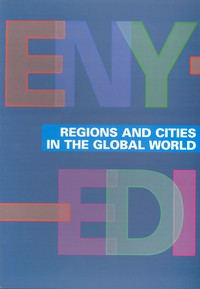 |
REGIONS AND CITIES IN THE GLOBAL WORLD
edited by:
Gyula Horváth
Pécs : Centre for Regional Studies, Hungarian Academy of Sciences
2000
243 p.
ISBN 963 9052 17 5
|
This book was prepared in honour of György Engedi, the world-famous researcher in regional science. The volume comprises the results of research by his friends and colleagues active in a variety of international research projects in the field of regional processes, in the determinant factors of regional development and in the consequences of the transformation of Central Europe at the turn of the millennium.
Although this book was published specifically for György Enyedi's 70th birthday, it should not be considered simply as the – by now customary – gesture of respect. Quite independently of the birthday, this work merits publication in its own right since it deals most effectively with so many current and importunt problems. The selection of topics for inclusion displays none of the amiable tedium so typical of many Festschriften: truly serious issues are discussed – such as the impact of globalisation on the fundamentals of economic und social space, the responses of regional policy to new challenges, the reactions of nations to changes in regional development processes and future alternatives for development. The fourteen authors represented in this book introduce the motives for globalisation, demands that economic und social policies be adapted to local und regional factors, together with the forms of action necessary for the realisation of these aims.
Regional science is a discipline of the 20th century. The formation of its terminology, the institutionalisation of its research programmes, the development of its educational system und the integration of its research results into the political decision-making process all took place within this period.
We can now boast several truly distinguished scientific workshops operating worldwide. Their eminent personalities – sometimes by virtue of their leading positions in international organisations – created that discipline which we now term regional science.
György Enyedi is one of those most eminent personalities within that élite international group of researchers who have played a major role in the long-term development of regional science. He was born in Budapest on the 28th of August 1930. He graduated from the Budapest University of Economics, where he commenced his research career. His early studies in economic geography concentrated on the development und regional problems of world agriculture. During this period of almost fifteen years he published his first papers und edited his first books. He was a lecturer in agricultural geography both at the Budapest University of Economics and at the Agricultural University of Gödöllő.
In the early 1960's he became a researcher at the Geographical Research Institute of the Hungarian Academy of Sciences and was appointed Deputy Director (at a very early age) in 1962. At this time his research gained a new dimension in thatthe organisational factors of rural space became the centre of his interest. His studies in agricultural and rural typology revealed the negative consequences of the transformation of the Hungarian settlement system with the social and economic inequalities of rural space. The international reputation of his activities at that time is demonstrated by the fact that he was the leader of a world wide comparative research team studying the development of rural space between 1972 and 1984. Between 1984 and 1992 he was Vice-President of the International Geographical Union, the Union's General Assembly elected him against the candidate proposed by the Hungarian National Committee!
The 1980s brought new challenges for György Enyedi. In this period he integrated a great deal of research being carried out in isolation into a new organisation when in 1984 he founded the Centre for Regional Studies of the Hungarian Academy of Sciences. His scientific carreer then turned in a new direction as he studied regional inequalities and the spatial development of urbanisation.
In Eastern Europe the ideology of the regional and settlement policy of state socialism (the classical Marxist theory, urbanist concepts, planning theory) and its relevant objectives (proportionate development, the reduction in differentiation between rural and urban settlements, and the equal spatial distribution of state and social benefits) proved to be strong limiting factors for regional science. The idea of a homogeneous society had different effects on scientific theories in different countries. In a relatively short time Hungarian social science – due to György Enyedi's close relationships with western scientific teams – produced important results in the study of uneven spatial development, in the negative tendencies of the transformation of settlement systems, and "expressis verbis" question marks were mised regarding the efficiency of a central planning system with economic policies which disregarded local regional features.
The results of an analysis of spatial transformation within the planned economies revealed that the East Central European economic and urbanisation system is not unique; it is simply that West European-style urbanisation and development phases followed each other, albeit with significant delays. Differences in regional development may be explained by this late development and also by the period of state socialism.
Regional policy needs to move in a different way from the basic demands of the market economy. The search for an optimum way was hindered by the simple fact that the terms used during the time of state socialism were met by the strongest opposition. At first, regional policy was rejected outright by the prevalent Marxist social theory and down-graded to the level of a basic service for the planned economy. Even later – during the period of socio-economic reform – the mildest local initiatives favouring decentralisation were still frowned upon and often labelled as "provincialism" in the most negative sense. Although György Enyedi himself formulated coherent concepts regarding the necessity of an innovation-oriented regional policy, the anti-modernisation policy of the economic and political system showed no interest whatsoever in the realisation of his ideas.
During the 1980s international science was characterised by the rapid development of integrative spatial science taking place in parallel with the modernisation of the more traditional disciplines. The preconditions for regional science to become an independent discipline were favourable at that time and it was György Enyedi who had primary role in this. His theoretical competence, his well-balanced social opinions, his innovation-oriented inspirati kindliness were together an enormous attractive and inspirational force for regional scientists. He became a major navigation point for the growing generation of young regional scientists who were starting to deal with the problems of regional processes in the late 70's in more and more remarkable ways.
The Centre for Regional Studies of the Hungarian Academy of Sciences, the leading organisation in Hungarian regional science with a staff of one hundred located at four institutes, deals with the analyses of European and Hungarian regíonal development. The Centre's Director-General from 1984 to 1991 was György Enyedi. In 1986 the Regional Science Committee of the Hungarian Academy was established and its chairman from its inception in 1986 until 1990 was György Enyedi. The Journal "Tér és Társadalom" (Space and Society) was first published in 1987. In the 32 issues now collected into 14 volumes nearly three hundred scientific papers have been published. György Enyedi is still the chairman of the editorial board. 18 books have been published in the series of monographs entitled "Területi és Települési Kutatások" ("Regional and Settlement Research"). The 'Discussion Papers' an English language series published in 35 volumes introduce the results of Hungarian regional research worldwide. In 1989 a Post-graduate School of Regional and Urban Development was established at the Faculty of Economics of the Janus Pannonius University of Pécs. Today graduate, post-graduate and also PhD courses are held there. Apart from this, several regional policy and regional economics training programmes are held at three universities and two colleges in Hungary. The elevation of regional science to full university discipline level is also to the credit of György Enyedi and it should not be forgotten that he became a University Professor at Montpellier University at the very early age of 42. He has spent seven years as guest Professor at various foreign universities and has also presented – and still presents – lectures at the Universities of Debrecen, Pécs and Budapest.
This truly creative and successful career which is distinguished by no less than 40 books and by more than 300 other publications is, in addition, richly decorated with an enviable series of honours and recognitions: György Enyedi is a honorary member of seven foreign geographical societies; the Hungarian Academy of Sciences awarded him Correspondent Membership in 1982 and Ordinary Membership in 1990; he has been Vice-President of the Hungarian Academy of Sciences since 1999; he is a member of the Academia Europea in London and a member of the editorial board of several international journals; he is the recipient of several Hungarian and international awards and honours.
With this book dedicated to the scientist, scientific organiser and professor we hope most sincerely that the results to be published in the following papers will further enrich the field of regional science and that they will inspire regional scientists to new research, discussion and co-operation – in the spirit of György Enyedi's "Ars Poetica".
.
Attached files

